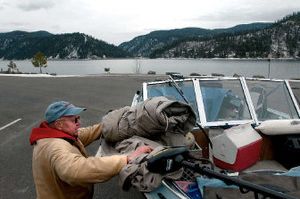Fuel-saving tips for towing the boat
BOATING -- With fuel prices high, trailering a boat has become more expensive.
Some simple fuel conservation measures can add up to real money by the end of the season.
Read on for nine ways to stretch that tank of gas with your tow vehicle, courtesy of BoatUS:
Basic maintenance: Keep your tow vehicle’s engine tuned and replace the engine air filter on a periodic basis.
Drive ahead: Moderate your use of the accelerator pedal by “driving ahead” – by looking ahead and anticipating traffic, you will likely brake less aggressively and reaccelerate without having to be heavy on the fuel-hungry accelerator pedal. Take it easy when starting from a dead stop.
Stop “cruising”: With automatic transmissions, stay off the cruise control, especially when traveling in hills or mountains. Cruise control cannot anticipate going up or down a slope, and tends to use more fuel due when the transmission kicks down to a lower gear to compensate for speed loss on a hill.
Tire tip: Keep tires properly inflated to the recommended PSI on both the tow vehicle and trailer. Check PSI before every trip.
Cover up: On long trips, use a tight-fitting boat cover when towing, which helps decrease wind drag and improves fuel economy.
Lighten up: Lighten the load by carrying just what you need for the day or weekend in the tow vehicle and onboard your boat. Also, at about six pounds per gallon of gas, try to keep the boat’s fuel tank near empty when trailering long distances.
Drain it: Never leave water in a live well or bait tank. At a little over eight pounds per gallon, carrying an extra 25 gallons of water in these built-in tanks can represent 10 percent of the boat’s total weight. Filled wakeboard boat ballast tanks or bags can also add significantly more weight – from several hundred to over 1,000 pounds of water. Emptying tanks also slows the spread of invasive species.
Slow down: A decrease in towing speed of just 5 or 6 miles-per-hour can lead to a noticeable decrease in fuel consumption. Trailer tires have a maximum speed of 65 mph, so going over that will not only harm MPG, but could damage tires as well.
Go local: Plan more trips closer to home this summer.

